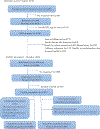Increased frequency of participation in civic associations and reduced depressive symptoms: Prospective study of older Japanese survivors of the Great Eastern Japan Earthquake
- PMID: 33744732
- PMCID: PMC9136530
- DOI: 10.1016/j.socscimed.2021.113827
Increased frequency of participation in civic associations and reduced depressive symptoms: Prospective study of older Japanese survivors of the Great Eastern Japan Earthquake
Abstract
Rationale: Few studies have examined whether changes in participation in civic associations can mitigate depressive symptoms among older disaster survivors.
Objectives: We examined prospectively the association between changes in participation in civic associations and changes in depressive symptoms among older survivors of the 2011 Great Eastern Japan Earthquake.
Methods: We analyzed questionnaire-based survey data on pre- and post-disaster participation in civic associations and depressive symptoms compiled for 3567 respondents aged 65 years and above. Changes in these symptoms were assessed using a 15-item Geriatric Depression Scale (GDS) as a continuous variable for 2010 and 2013. We investigated four types of civic associations: sports, hobby, voluntary groups, and senior citizens' clubs. Changes in participation were calculated by subtracting the participation frequency measured in 2010 from that measured in 2013. Applying 95% confidence intervals, we used linear regression models with imputation to estimate the age- and sex-adjusted and multivariate-adjusted standardized coefficients.
Results: The survivors' GDS scores increased by 0.13 points on average between the pre-disaster and post-disaster periods. Average changes in the participation frequencies of respondents in each group were respectively +0.36 days/year, -5.63 days/year, +0.51 days/year, and -1.45 days/year. Increased frequencies of participation in the sports and hobby groups were inversely associated with changes in GDS scores (B = -0.003, Cohen's f2 = 0.10, P = 0.01 and B = -0.002, Cohen's f2 = 0.08, P = 0.04, respectively). The associations did not differ depending on the experience of housing damage caused by the disaster. In addition, we did not observe a significant association between changes in participation frequencies for voluntary groups or senior citizens' clubs and changes in GDS scores after multivariable adjustment.
Conclusions: Depressive symptoms of older adults post-disaster may be mitigated through increased frequency of participation in sports and hobby groups; yet, civic participation did not mitigate the adverse impact of disaster experiences on mental health.
Keywords: Aging; Civic associations; Depressive symptoms; Great east Japan Earthquake; Hobby groups; Natural disasters; Social participation; Sports group.
Copyright © 2021 The Authors. Published by Elsevier Ltd.. All rights reserved.
References
-
- Archibald HC, Long DM, Miller C, Tuddenham RD, 1962. Gross stress reaction in combat--a 15 year follow-up. Am J Psychiatry. 119, 317–322. - PubMed
-
- Burke WJ, Roccaforte WH, Wengel SP, 1991. The short form of the Geriatric Depression Scale: a comparison with the 30-item form. J Geriatr Psychiatry Neurol. 4(3), 173–8. - PubMed
Publication types
MeSH terms
Grants and funding
LinkOut - more resources
Full Text Sources
Other Literature Sources
Medical
Miscellaneous


